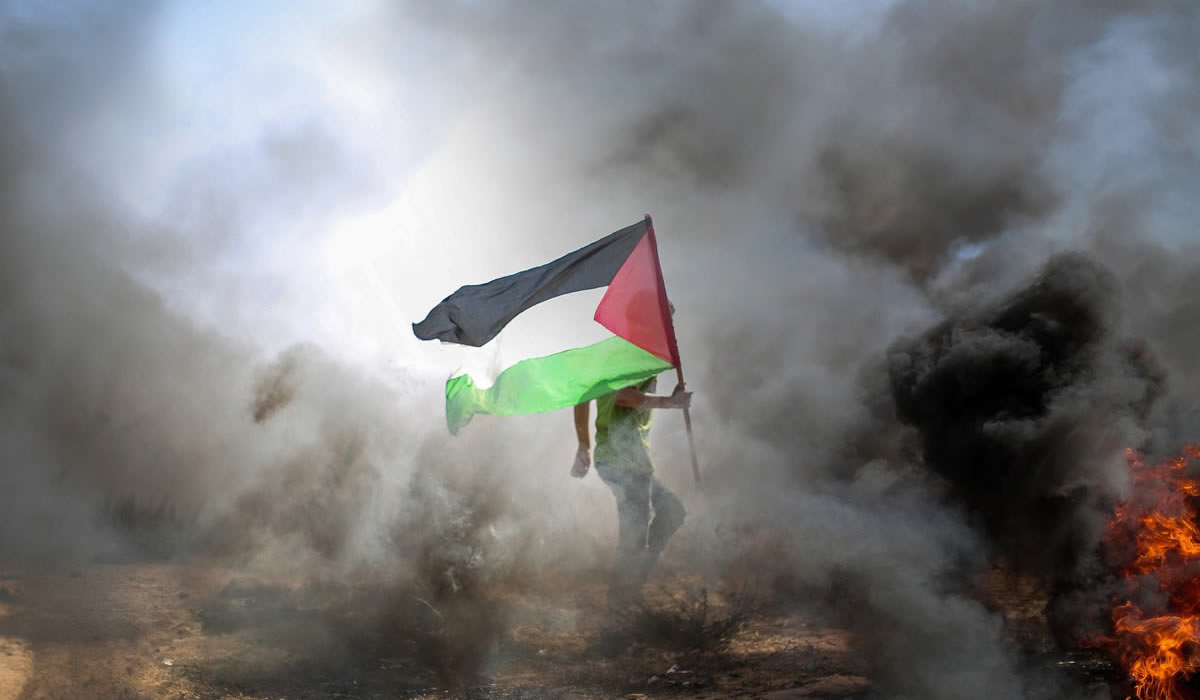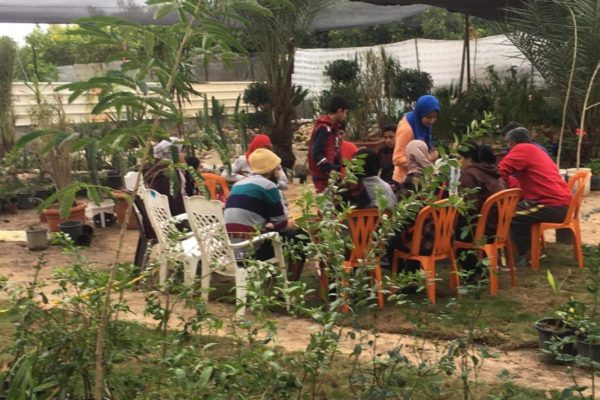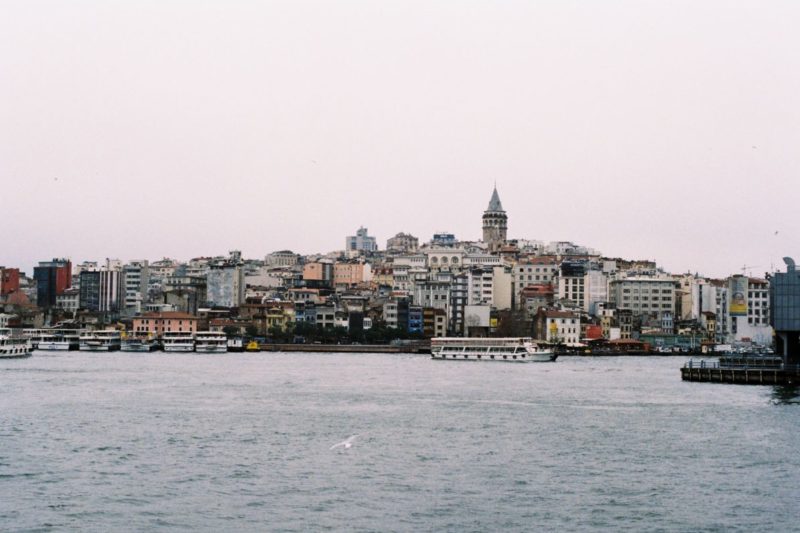Palestine: Fleeing home to save her life (1)
Omayma Masoud, a journalist with more than 20 years’ experience, was forced to leave her native Palestine after being threatened by Hamas. Forced by the Hamas movement to become its spokesperson, she chose to flee over being forced to do the unacceptable. Having dedicated her life to journalism and the fight for women's rights she knew at that moment, by the commitments to those values, she had just signed her own death warrant.

I did not have the luxury of choosing which day to leave. It was a Wednesday, during the days of the heatwave that hit Gaza in September 2018.
With just one big suitcase and a handbag, I said goodbye to my sister, closed the door to my house and handed her the keys. It was seven o’clock in the morning when I got into the taxi, headed to the Rafah border crossing point in the south of the Gaza Strip. The ride took 40 minutes, but it lasted a lifetime in my mind.
Earlier that week, I managed to sell my apartment which was located in the most luxurious neighbourhood on the magnificent shore of Gaza City. Selling my home was hard but necessary to finance my journey, or rather my escape.
I paid $2,000 to a man named Abu Mahmoud to coordinate my passage through the Rafah border crossing without registering for travel with the Hamas authority, and without my name being put on the list of travellers, which is usually a requirement under the system enabling travel in Gaza.
Looking through the taxi window, my eyes tried to absorb all the tiny details of the fading sight of my house, my garden, the waving figures of my sister and my beloved niece, little Omayma. Then the streets, buildings, stores, schools, trees and shores. Deep inside my soul, I sensed it was the last time I’d see them. I fought my tears back so hard that my stomach cramped.
Passing the Palestinian side of the Rafah border crossing did not take much time, as the money that I paid in advance eased all the obstacles. A rusty old bus took the travellers to the Egyptian side of the border crossing where it was a completely different story.
I held the other Omayma’s hand and ran to get our suitcases and get out
I began to develop strange mixed feelings of relief at crossing the borders without being discovered, and feelings of fear, anticipation and apprehension about what might unfold in the days to come.
With great difficulty, I tried to make my way among the hundreds of travellers crowding in front of just two border officers to present my passport, longing to be granted entry to Egypt, fearing being sent back to Gaza.
Loud, harsh, insulting words and curses thundered out, ordering people to back off and wait until the officers had had their breakfast. It was to be two hours before they would appear again.
I sank back, my body fatigued, dragging myself on swollen feet and looking for a spot to squeeze myself in and rest amongst the hordes. I could not see the floor. Sleeping people filled every inch of the hall.
I almost fell to the ground when two young men hurried to hold my hand and help me to stand up. “Are you alright?” they asked. “No, I am not. I need to sit down. I want to sleep,” I replied.
They talked some women into making a space for me to lay down next to them. They used their luggage as a barrier around me, to give me some privacy. As soon as my head touched the hard cold tile of the floor, I fell asleep.
I dreamed of my father patting my shoulder gently and whispering in his deep, warm voice, “I am worried about you facing the difficulties and adversities that await you and I want you to focus only on the light at the end of the tunnel. It is your deliverance.” A bright light flashed in my eyes. I realised it was morning.
It was a new dawn, but it was a repeat of the previous day – the waiting, the monotony of time, the laziness of the hours, the crowding at the appearance of the two officers, and the retreat under their insults and curses.
Once the night approached, I prepared my spot, sat down with others in a circle of broken hearts and heart-breaking lives, each person with a story waiting to be told. I am honoured to be their storyteller.
Yhia, a handsome 26-year-old man, lived in the Al Shata’a refugee camp in the west of Gaza city. He had been married for three years, living with his wife in a room in his family’s tiny flimsy house. He owned a small mobile phone repair shop, which was completely razed to the ground by an Israeli bombardment. He could not afford to buy the medicine needed for his wife’s pregnancy; she miscarried three times. His tears ran down his face when he told me, “I lost everything, if the Egyptians won’t grant me entry to Egypt, I will go back to Alawda fence to be killed by the Israelis. I want to fly away to a better place, on earth or in the sky.”
It would be impossible for me to forget the look in his eyes, revealing the darkness and despair of his soul. I would return to Yhia’s story later and once more look into his soul, through his eyes, in a different part of the world.
A big family sat with their children in a tight circle on the dirty dusty floor of the travellers’ hall, talking and eating, while children played, cried and laughed, all at the same time. They filled my eyes and ears with so much heart-warming noise and, at the same time, real sadness. I offered the little children all the food I had on me. I joined the circle and listened to their stories.
Kamal, a 43-year-old man, a father of 11 children aged two to 20 years old. He was very tall but very slim with a dark, pale, tired, long face. His wife, Salwa, was five years younger but in no better condition than him.
Kamal was an officer in one of the security services of the Palestinian National Authority and an active member of the Fatah party, a heinous crime for the religious rulers of Gaza.
He had been subjected to investigations so many times and had been a prisoner in Hamas jails, saying he had lost five of the best years of his life. He said: “I missed the births of some of my children. I had missed the first steps and the first words of my children. How in the world would I have the chance to live such moments ever again? I was forced into early compulsory retirement. I had lost half of my monthly salary and it was not enough to feed these hungry mouths with bread alone. Hamas is still pursuing me and my eldest son. I do not want to live for the day that they put him in prison, knowing exactly how he would be tortured inside. I sold the house that I had inherited from my father to finance this journey. I no longer have anything except for my children and my wife. I want them to live a decent life for as long as they can.”
The Sinai desert
It’s the third morning. With blurry eyes, I could see frightened faces, anxious souls and attentive ears eager to hear their name called on the loudspeaker to announce the end of a strenuous wait that saps human dignity. Was it true that they called my name?
I happily rushed towards the two officers to receive my passport stamped with an entry visa to Egypt.
Another hand extended in a hurry, pushing me to the side. I looked at her, she was a young, veiled girl, who was screaming: “It’s me, it is me. My name is Omayma”. The officer looked at both of us, asking which of us was Omayma? We both said: “It is me.”
He put the passport back down and took another one, opened it and called out the name. Omayma, again. He laughed so much he cried. He took the first passport and reopened it and read out the family name. It was mine. The second passport was hers. Relieved, I asked him why he had not looked at the photos? He looked surprised and said: “Good question. Get the hell out of here before I change my mind and keep you here forever.”
I held the other Omayma’s hand and ran to get my suitcase and hers and burst out of the arrival door into the infinite space of the Sinai desert, the north-eastern gateway to Egypt.
The two Omaymas had become one, bargaining the taxi fare with five other strangers and sharing their food, water, and company.



